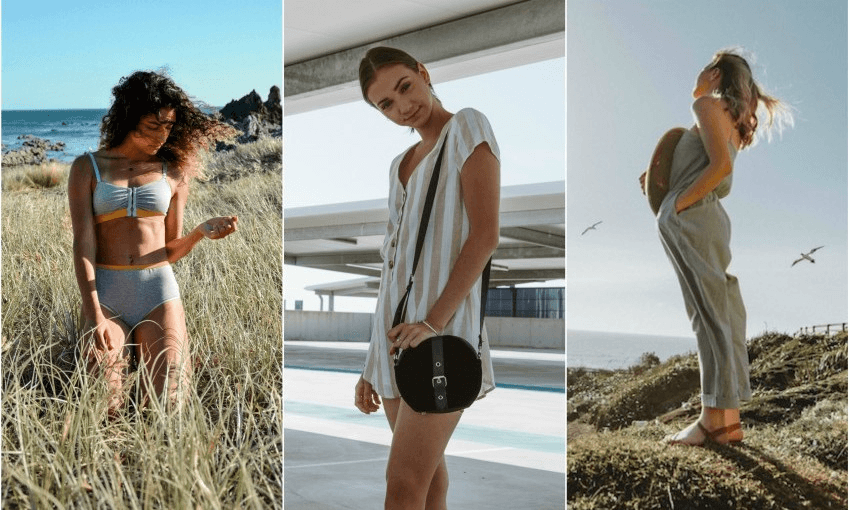Buying New Zealand made matters to you? All about ethical gear and sustainable materials? Read on.
If the outrage over World’s practice of selling clothes manufactured in Bangladesh and China has taught us anything, it’s that if you make a claim about your clothes you should to be able to back it up.
World founder and ethical fashion champion Dame Denise L’Estrange-Corbet claimed it’s almost impossible to manufacture clothes in New Zealand, so we set out to find some labels that are not only creating garments (and jobs), but have taken extra steps to ensure their goods are sustainable and ethically made.
If you judge the ethics of New Zealand’s fashion industry by the 2018 results of the Tearfund and World Baptist Aid’s Ethical Fashion Report alone, we have a long way to go. But it’s not telling the full story, as there are a number of New Zealand brands that deserve our attention. And yes, these brands are not necessarily cheap like chain stores, but they are comparable to other designer brands.
Here’s five ethical clothing labels to consider:
Barred
The founder of Barred, Natalie Park, is a young Auckland designer who takes care to ensure fabrics are sourced as sustainably as possible, using natural fabrics such as linen and tencel – a sustainably produced material regenerated from wood cellulose. Barred is reasonably priced, with items ranging from $60 for a top to about $150 for a jumpsuit or dress.
Barred combines style with social enterprise, as 20% of each garment sale goes to projects partnering with Tearfund. The social enterprise model is a traditional win-win, with the aim of benefiting society while helping business owners to achieve financial independence. The model also gives buyers the opportunity to make considered purchases, knowing their money is going towards a charitable or sustainable cause.
Turning to sustainability in fashion, it is estimated that in New Zealand, around one hundred thousand tonnes of textiles end up in landfills each year. Because of the chemicals contained in these textiles, they contaminate soil and release greenhouse gases as they break down. Global warming, anyone?
Velvet Heartbeat
A sustainable brand which treats the environment as a stakeholder, rather than an afterthought, is Velvet Heartbeat. The brand uses dead-stock and offcuts as materials for its bags and accessories. This is an example of a circular economy, where materials are used and then repurposed or regenerated for as long as possible, which is less wasteful than the linear economy where materials are thrown away after the end of their first use.
Suzie Eggleton, founder of Velvet Heartbeat, is also committed to a 100% vegan brand, so does not use animal products like silk and wool. She uses a variety of machinery and tools to construct her goods, including an old Singer industrial cylinder arm walking foot (the kind used for boot making), a rotary cutter, a shoe anvil and a pair of sharp shears.
Offcut
Another New Zealand brand which is a proponent of the circular economy is Offcut. Offcut produces caps using leftover fabrics consigned to the bin and are produced in limited edition runs, and each cap has a ‘forever’ warranty. Offcut has also partnered with Trees for the Future, which plants a tree for each cap purchased. Trees for the Future works to provide employment opportunities for farmers living below the poverty line in underdeveloped countries.
Nisa
Closer to home, Wellington cotton lingerie brand Nisa proudly employs former refugees. Nisa’s worskhop is in the heart of the central city, enabling the workers to improve their English and confidence while allowing them to give back to their new communities. By creating fair and meaningful employment opportunities, Nisa is part of a broader revolution in the industry, pushing companies towards providing better working conditions for all.
Nisa and the Unmentionables are currently running a special campaign where customers donate $15 and Nisa provides a pair of underwear to women in refugee camps. Nisa also uses GOTs-certified organic cotton wherever it can. Organic cotton is better for the environment, as it requires less water to produce, and is treated without using chemicals (which can be harmful for workers and wildlife). And organic cotton is also healthier for the wearer, benefiting those with allergies and skin sensitivities to chemicals.
Aida Maeby
Aida Maeby is another New Zealand brand who uses GOTs-certified organic cotton, with designer Jess Matthews producing cross-seasonal clothing to be worn for years, known as ‘slow-fashion’. Matthews is a believer in the movement #30wears, which asks consumers to consider if we’d wear a new piece of clothing at least 30 times before we buy. If you’re not going to wear it or use it at least this many times, do you really need it?
*
So how do most of these brands make their wares? They’re working out of their small homes or workrooms, and maybe because of this (and unlike the chain stores found in malls across the country) they don’t yet have a wide-reaching presence. In a time where traditional retail is in decline, a purchase from these businesses also props up the local economy.
Hemma Vara is a freelance fashion writer, trade mark and fashion-law enthusiast and founder of ethical fashion store The Good Trend.
The Spinoff’s business section is enabled by our friends at Kiwibank. Kiwibank backs small to medium businesses, social enterprises and Kiwis who innovate to make good things happen.
Check out how Kiwibank can help your business take the next step.
